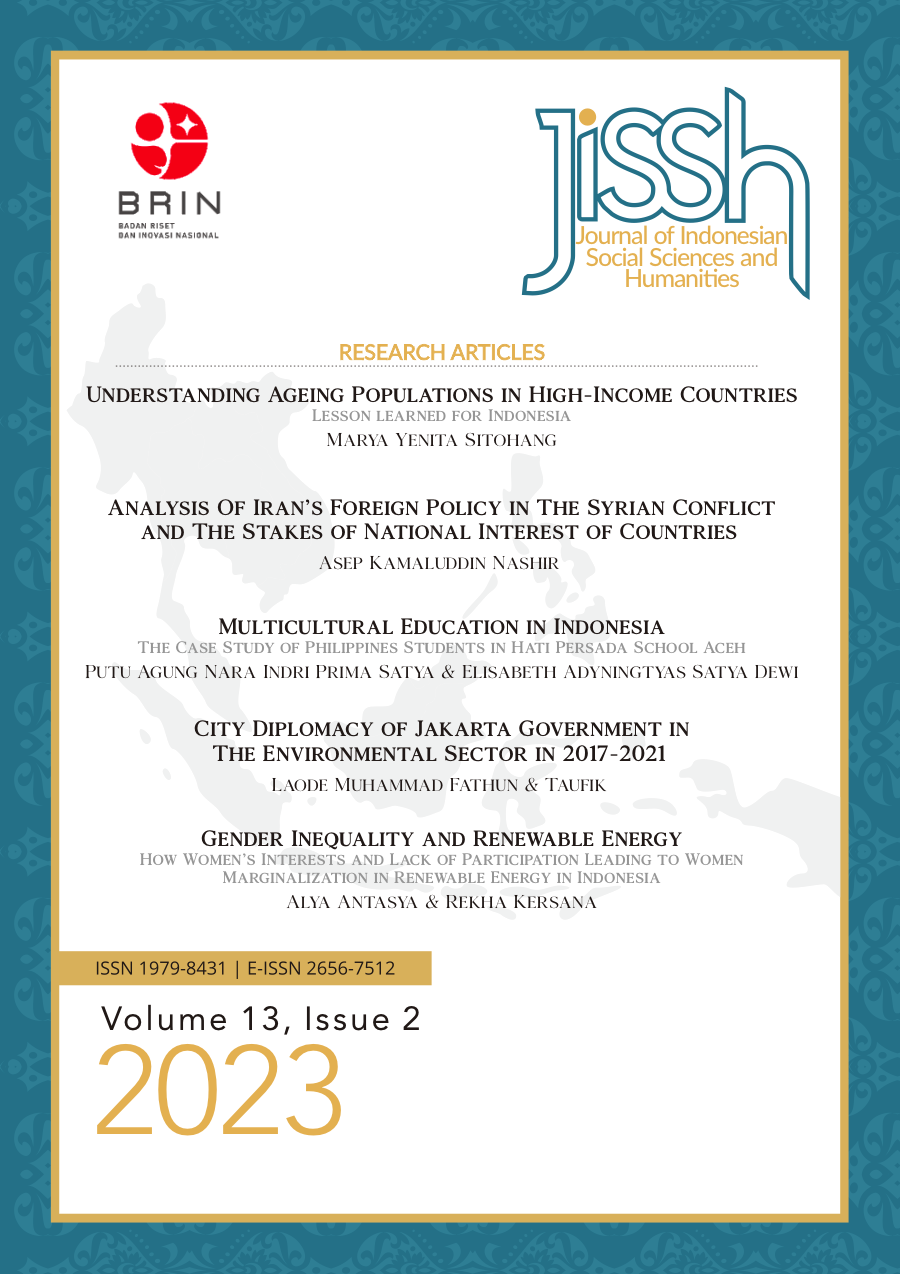Analysis Of Iran’s Foreign Policy In The Syrian Conflict And The Stakes Of National Interest Of Countries
Keywords:
Iranian Foreign Policy Model, Syrian Conflict, Regional InterestsAbstract
This paper aims to analyze Iran’s foreign policy formulation model in the conflict in Syria. Furthermore, this paper tries to identify Iran’s foreign policy formulation model as a response to the Syrian conflict. This writing uses a qualitative research method, that emphasizes case studies of Iran’s foreign policy in the Syrian conflict by emphasizing literature studies that focus on official documents, reports, and certain international analyses, which are used to collect some data to provide an overview of the focus of analysis. Theoretically, Lovell’s thoughts on models of foreign policy formulation and adaptation as a response to external conditions, namely leadership, accommodative, confrontative, and concordance strategy are used as an analytical tool to analyze Iran’s foreign policy formulation and response in the Syrian conflict. The findings in this paper explain that Iran’s foreign policy formulation is more influenced by leadership factors where the domestic political system emphasizes the importance of achieving national interests, namely economics, and security. While the implementation or response of Iran’s foreign policy is more confrontative considering that Iran’s involvement is more likely to encourage an increase in conflict escalation against countries in opposition to Iran while protecting the Syrian regime under Assad. The results of this article illustrate that a country’s foreign policy is influenced by the political system that characterizes the nation while also explaining the importance of foreign policy responses by national interests even though confrontational interactions are ultimately a consequence of foreign policy implementation.
References
Berlianto, “Menlu AS: Embargo Senjata terhadap Iran Tetap Berlaku” dalam http://international.sindonews.com/read/1032123/42/menlu-as-embargo-senjata-terhadap-iran-tetap-berlaku-1439352702. di akses pada Agustus 2023
BBC, (2015) “Perundingan Nuklir Iran Capai Kesepakatan” dalam http://www.bbc.com/indonesia/dunia/2015/07/150714_dunia_iran_nuklir. di akses pada Agustus 2023
C. Aminuddin, ( 2015) “Perang Suriah, Iran Tingkatkan Bantuan untuk Assad” dalam http://dunia.tempo.co/read/news/2015/10/28/115713977/perang-suriah-iran-tingkatkan-bantuan-untuk-assad di akses pada Agustus 2023
Darmawan, Rizky (2023) “Apa Hubungan Negara Iran dan Suriah?” diakses melalui https://international.sindonews.com/read/1094887/45/apa-hubungan-negara-iran-dan-suriah-simak-penjelasannya-1683788759
V. Maulana, (2012) “Iran Dukung Penuh Serangan Rusia di Suriah” dalam http://international.sindonews.com/read/1049640/43/iran-dukung-penuh-serangan-rusia-di-suriah-1443697765.
V. Maulana, (2012) “Iran Siap Tingkatkan Bantuan ke Suriah” dalam http://international.sindonews.com/read/1054090/43/iran-siap-tingkatkan-bantuan-ke-suriah-1445164535 di akses pada Agustus 2023.
Welle, D. (2018, Maret). Diambil kembali dari https://www.matapolitik.com/apa-kepentingan-negara-negara-dunia-yang-terlibat-perang-suriah/
Z. Laub, ( 2015) “International Sanctions on Iran” dalam http://www.cfr.org/iran/international-sanctions-iran/p20258 di akses pada Agustus 2023
Downloads
Published
Issue
Section
License

This work is licensed under a Creative Commons Attribution-ShareAlike 4.0 International License.
Authors who publish with this journal agree to the following terms:
1. Authors retain copyright and grant the journal right of first publication with the work simultaneously licensed under an Attribution-ShareAlike 4.0 International (CC BY-SA 4.0) license. This license allows others to remix, adapt, and build upon the work, as long as they credit the author and license their new creations under the same terms.
2. Authors may enter into separate, additional contractual arrangements for the non-exclusive distribution of the journal’s published version of the work (e.g., posting it to an institutional repository or including it in a book), provided there is an acknowledgment of its initial publication in this journal.
3. Authors are permitted and encouraged to post their work online (e.g., in institutional repositories or on their personal website) prior to and during the submission process, as this can lead to productive exchanges and increase citations of the published work (See The Effect of Open Access ).


















